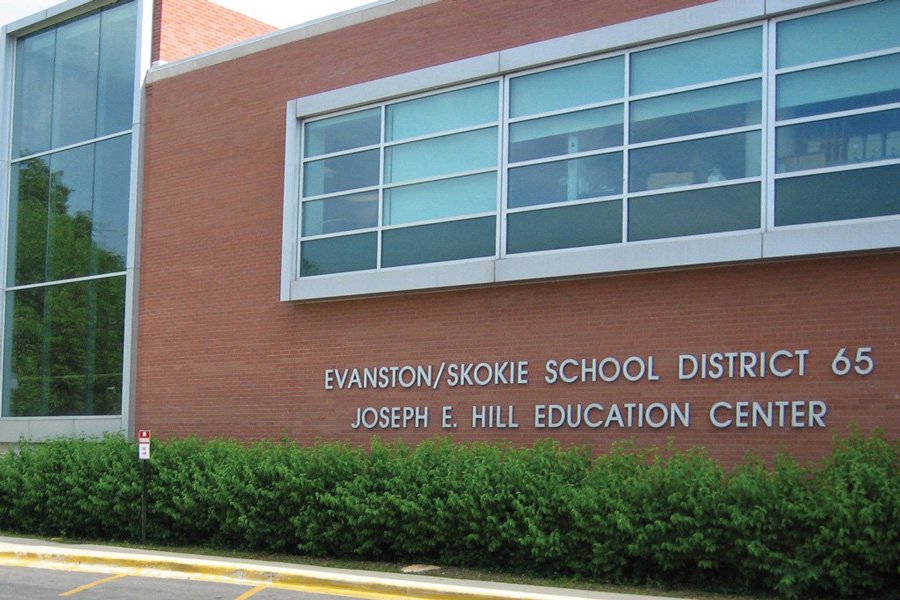District 65 SEPAC guest speakers discuss accessibility in education
Daily file photo by Patrick Svitek
The Evanston/Skokie School District 65 Education Center, at 1500 McDaniel Ave. In its first meeting of the 2021-22 academic year, Evanston/Skokie School District 65’s Special Education Parent Advisory Council held its first meeting of the 2021-22 academic year Tuesday.
October 6, 2021
In its first meeting of the 2021-22 academic year, Evanston/Skokie School District 65’s Special Education Parent Advisory Council emphasized the continued importance of creating inclusive educational environments for all students.
SEPAC, which elected its first officers in May, seeks to advocate for disabled students and their families in District 65. The group began forming in 2020 with the goal of elevating parents’ and caregivers’ voices in their children’s education, an effort led by Romy DeCristofaro, assistant superintendent of student services. Marquise Weatherspoon and Kelly Baldrate serve as the council’s co-chairs.
“Our mission is for children who have IEPs and 504s,” Baldrate said. “But I see the vision is broader, and it really is about the larger value of inclusion in our community.”
Guest speakers Julie Causton and Kate MacLeod defined their idea of inclusive education during the opening of Tuesday’s meeting.
Both speakers have backgrounds in research and are co-founders of Inclusive Schooling, an organization that supports administrators, educators and parents who wish to create more caring, creative inclusive schools for all learners. Their team conducts live courses, workshops, presentations and innovative support for accessible education.
In the past, special education hinged on taking elementary students out of their classrooms to receive services including speech and language and occupational therapy. This method can be disruptive for a classroom environment and prevents students from learning from one another, the pair said.
To be more inclusive, general and special education teachers should co-teach and meet students where they are, in their own classroom, they said.
“We no longer accept that separate classrooms, separate schools and separate lives are in the best interest of any students,” Causton said. “Belonging is a human need, (and) our educational system, practices and spaces need to be reimagined.”
Inclusive education helps all students, Causton said. She referenced a list of findings on inclusive practices in the classroom, which found that they created benefits across ages, ability levels and subject areas.
During the meeting, Inclusive Schooling shared its video “Because of Oliver,” a story about a student on the autism spectrum. Rather than sending him away to special education, his teachers create lessons that teach to everyone in the class. They change the rules about sitting “criss-cross applesauce” and allow students to write, speak or type their answers.
Throughout the virtual event, they asked people to message in the chat and find connections with other participants.
“We really want an interactive (space), we want to engage with you in the chat, we want you to share with us and we want you to participate in a way that feels good to you,” MacLeod said. “Really think about comfort, observe when you want to, engage when you want to, turn your cameras on and off.”
Throughout the meeting, leaders modeled inclusive practices, too. An hour into the session, Causton and MacLeod encouraged participants to turn their cameras off and take a two-minute stretch. Following the break, they encouraged participants to return to the space on their own time because learners come back at different paces and people finish tasks at different times. Causton said as an educator, she has to be comfortable with variations in time.
Causton and MacLeod also modeled one way co-teaching can look. At times, Causton spoke while MacLeod wrote in the chat to exemplify the inclusion of varying teaching styles.
“Everyone benefits from meaningful participation and opportunities to learn the grade level content with diverse peers,” MacLeod said. “We must trust that all students come to us as incredible people who do not need to be fixed.”
Email: oliviaalexander2024@u.northwestern.edu
Twitter: @oliviagalex
Related Stories:
— D65 Special Education Parent Advisory Council elects first officers
— D65 school board candidates discuss support for special education students in virtual forum
— D65 places more students with disabilities in general education, but racial achievement gap persists



